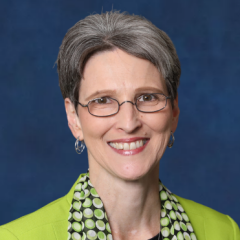Happy Admin Month! Take a look at what’s in store ›
March 26, 2025
Is Entrepreneurship Right for You?
.jpg.medium.800x800.jpg)
For many administrative professionals, the idea of becoming their own boss is both exciting and overwhelming. Is entrepreneurship the right path? What does it really take to transition from a traditional admin role to running a business? Nakia Whittaker knows this journey firsthand.
Starting her career in administration in 1998, Nakia’s professional growth was shaped by mentorship, continuous learning, and a desire to create something of her own. After attending her first APC conference in 2014, she was inspired to take her career to the next level. By December 2018, she launched KISS Virtual Services, her first business, and later expanded her reach with Virtual Allies World Brands in 2020. Today, she provides virtual administrative services, leads an engaged online community, and shares insights through her podcast series.
In this interview, Nakia shares her entrepreneurial journey, as well as the lessons, challenges, and advice she has for administrative professionals considering a similar path.
What inspired you to transition from an administrative professional to a business owner, and what were the biggest mindset shifts you had to make?
Nakia Whittaker: I was at a stage in life where I had more flexibility, and I started looking for ways to create additional income—something that could support my hobbies and give me more financial freedom. I also genuinely loved the work I was doing and wanted to explore how I could turn that passion into something of my own.
The biggest mindset shift was learning how to pivot the confidence I had in a corporate setting into becoming the face of my own brand. It’s one thing to advocate for others behind the scenes, but another to step forward and say, “This is my business. This is what I charge.” I had to embrace that confidence and learn to value my skills, especially in a field where administrative work is often underestimated.
What are some of the key lessons you’ve learned since launching KISS Virtual Services and Virtual Allies World Brands? Is there anything you wish you had known before starting?
The most important lesson I’ve learned is that everyone is not your customer. In the beginning, I wanted to do it all but I quickly realized I was much happier when I niched down and focused on my area of expertise. Now, I refer clients to other entrepreneurs when something falls outside of what I truly enjoy. I even added a section to my website listing common administrative tasks and highlighting what I specialize in, to help potential clients understand how I can best support them.
Another big lesson was learning to set—and stick to—boundaries. You have to clearly communicate what’s in scope and what’s not. Scope creep is real, and so are late-night emergencies that aren’t actually your emergencies.
One thing I wish I’d known sooner is how lonely entrepreneurship can feel. I had an amazing team in my previous role, and even when we worked remotely, it was easy to connect. That casual, everyday support was something I really missed when I started working on my own.
What were some of the biggest challenges you faced in the early days of entrepreneurship, and how did you overcome them?
In the beginning, everything felt overwhelming. There was so much information, but very little of it felt credible. Between scams, conflicting advice, and numerous Google search results, I didn’t know where to start. So, I leaned into what I knew: the structure and systems from my corporate background. I read small business books, joined local entrepreneur groups, and attended events. That foundation paid off, especially when COVID hit. Out of all my entrepreneur friends, I was the only one who qualified for the EIDL grant, and that made a huge difference.
One of the more personal challenges was not seeing people who looked like me in the entrepreneurial spaces I was entering. I grew up in a military family and attended an all-women’s college, so I was used to diverse and inclusive environments. But suddenly, I found myself in rooms that lacked cultural representation, and that really stood out to me. It sparked conversations within my network and ultimately inspired me to start Virtual Allies World Brands. That way, I could build the kind of supportive, inclusive business community I had always valued.
How did your experience as an administrative professional prepare you for entrepreneurship? Were there any unexpected skills you had to develop along the way?
My admin background was the foundation for everything. It gave me the structure to set up my business properly, the persistence to keep going when things got tough, and the research skills to make smart decisions (like which tools and software were worth investing in). Because of that experience, my startup costs were low, and I already had the systems mindset needed to run a business.
The most unexpected skill I had to learn was marketing and sales. I’ve always loved being behind the scenes, making things happen. But suddenly, I had to step into the spotlight. I had to be visible, get comfortable on camera, and build genuine connections with potential clients to help them understand who I am, what I do, and why they can trust me with their business. That part didn’t come naturally, but I grew into it.
Many admins dream of working for themselves but aren’t sure if it’s the right fit. What qualities or habits do you think are essential for someone considering entrepreneurship?
I honestly think being an administrative professional is the perfect training ground for entrepreneurship. We’re used to running the show behind the scenes. We know how to manage people, processes, priorities, and problems. That kind of experience translates in so many powerful ways.
But beyond the skills, mindset really matters. You need resilience, self-discipline, and a willingness to keep learning. And most importantly, you need support. Having a network of like-minded people who can encourage you when you haven’t landed your first client yet or when something goes wrong can make all the difference.
For admins who are curious about starting their own business, what steps would you recommend they take to explore entrepreneurship while balancing their current roles?
Start by getting clear on your why. What’s your motivation? For me, I wanted to turn the extra time I had—now that my child was grown—into something meaningful and fun, with some added income to enjoy the things I love.
Next, do some market research. Find someone doing what you’re interested in and ask for a quick coffee chat or advice. I used social media to find people who resonated with me, engaged with their content, and then reached out. You’d be surprised how many people are happy to help when they see you genuinely value their work.
These small steps can help you figure out if you actually have the time and flexibility to juggle both. For example, I dedicate my mornings to my full-time job (my clients know I don’t start on their work until 3 p.m.) and that boundary has worked well. I also plan ahead, meal prep, and create a routine that helps me stay balanced. Most days, I’m done by 7:30 p.m. unless I have a special project. It takes planning, but it’s doable.
Thinking about taking the leap into entrepreneurship?
If you want to learn how to apply your administrative skills to build a successful business, check out Nakia’s article, “From Admin to Entrepreneur: Using Your Skills to Start a Business,” for more in-depth advice.
Join the Conversation
Welcome to the ASAP Circle, a community platform for peer-to-peer conversation on trending topics, professional challenges, and shared experiences. We even have designated spaces for weekly Tuesday Coffee Breaks.






.jpg.medium-square.800x800.jpg)



